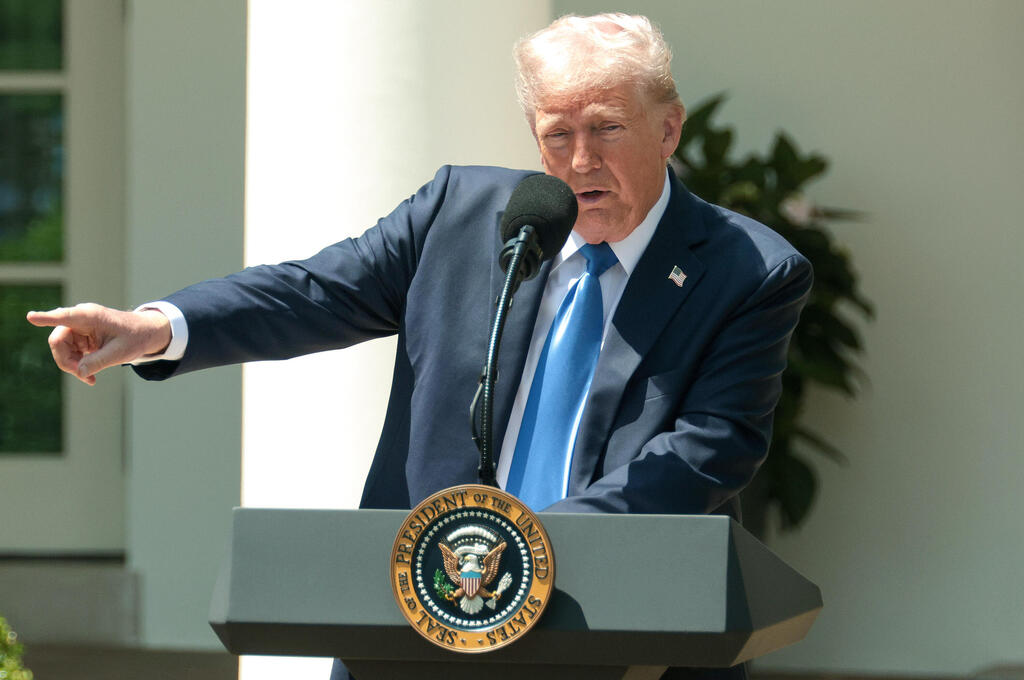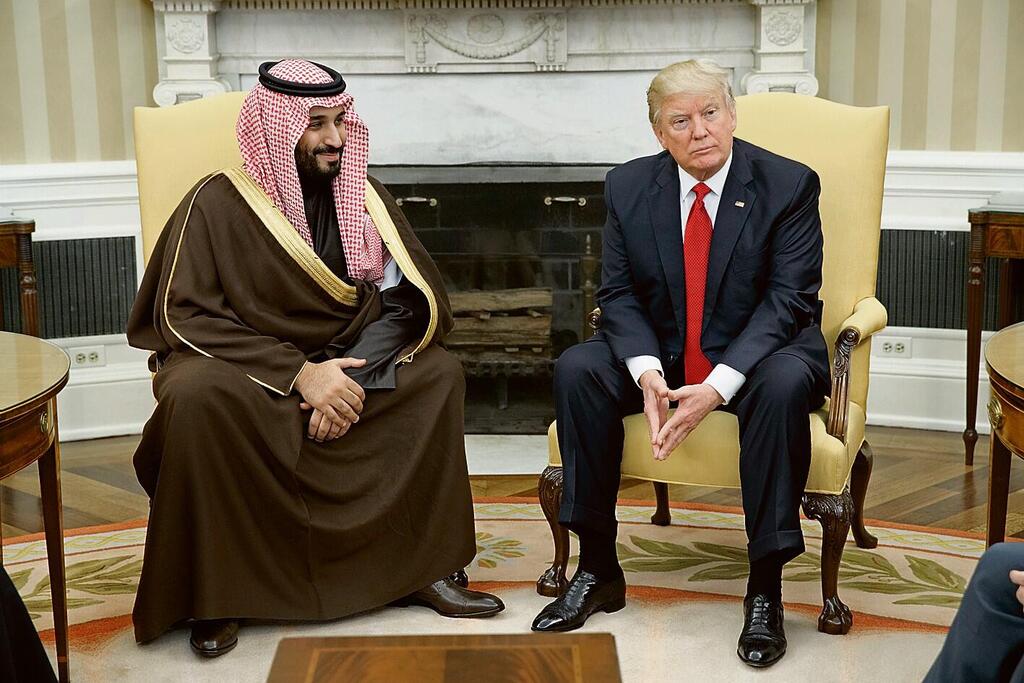Writing a horoscope might be more accurate than attempting to predict the next statements and moves of U.S. President Donald Trump. Astrology could be considered a hard science amid the uncertainty Trump has sown since entering the White House. But after more than 100 days into his second term, certain guiding principles behind his actions have started to emerge.
Based on these principles, it’s possible to anticipate what might unfold during his upcoming visit to the Middle East, which begins next week and will not include Israel. It might also shed light on the declaration Trump is expected to make within the next 24 hours—a statement he claims will mark a milestone in his administration’s Middle East policy, particularly regarding Gaza.
Seeking foreign policy wins
It’s clear that Trump and his inner circle are looking to rack up achievements in foreign policy and economics. The need to show results to the American public is meant to offset the damage caused by Trump’s erratic tariff policies, which have destabilized international trade and hurt the U.S. economy. Americans are beginning to feel the effects—rising prices and economic disruption triggered by Trump’s unpredictable decisions.
Trump hopes his visit to Saudi Arabia, Qatar and the United Arab Emirates will yield major returns. He literally expects to return to Washington with tens of billions of dollars in arms deals and investments from the oil-rich Sunni Gulf states.
But Trump knows the Gulf states want more than just high-tech military gear. Even with deliveries of F-35 fighter jets and long-range precision munitions, Saudi Arabia, Qatar, the UAE and Kuwait remain deeply concerned about Iran—specifically, the potential for Iran to acquire nuclear weapons.
The Saudi nuclear demand
That’s why Saudi Arabia is pressing for American support to develop civilian nuclear capabilities. The Sunni states, especially Saudi Arabia, understand the U.S. will likely allow Iran to maintain a civilian nuclear program. And like Israel, they know the jump from civilian nuclear capabilities to weapons-grade programs isn’t a difficult one—especially for wealthy oil states with deep pockets.
Saudi Arabia has previously asked past U.S. administrations, including Trump’s, to help it establish a civilian nuclear program mirroring Iran’s—one that could eventually be converted into a military program if needed. Until now, the U.S. has refused. But according to news agencies, Trump is expected to announce a shift in policy and agree to assist Saudi Arabia with such a program.
Normalization? not likely
This issue will likely be part of Trump’s upcoming announcement. However, the Saudis and Qataris won’t be satisfied with that alone. The Sunni Gulf states view the situation in Gaza as a potential flashpoint for regional war and domestic unrest. They want Trump to end the conflict in Gaza or at least broker a long-term truce.
Their demands include the resumption of humanitarian aid to Gaza, a durable ceasefire, and the establishment of Palestinian governance in the territory "the day after" Hamas. Saudi Arabia has explicitly stated its desire to see negotiations between Israel and the Palestinians over the establishment of a Palestinian state—not necessarily an agreement, but at least a practical dialogue. Egypt and Jordan share this goal.
However, because Israeli Prime Minister Benjamin Netanyahu strongly opposes both the return of the Palestinian Authority to Gaza and negotiations on a Palestinian state, normalization between Israel and Saudi Arabia appears to be off the table for now.
Israel is especially concerned about two potential concessions Trump may offer the Gulf states: allowing Saudi Arabia to independently enrich uranium as part of its nuclear program, and sidelining Israeli interests in any deal involving a ceasefire and the "day after" in Gaza—particularly if such a deal allows Hamas to survive with its weapons and leadership intact without securing the release of all Israeli hostages.
Strategic Affairs Minister Ron Dermer is in Washington trying to secure two objectives: to prevent Trump from surprising Israel and to ensure that Trump doesn’t pay for Gulf investments in the U.S. with Israeli concessions that would enable Hamas to remain in power.
White House power struggles
Another major factor shaping Trump’s policy is the power struggle inside the White House between two factions: the isolationists and the neoconservative hawks.
The hawkish faction—whose members include former National Security Advisor Robert O'Brien, Defense Secretary Gallagher and Secretary of State Rubio—advocates for asserting American global dominance through military power. Their motto: “Peace through strength,” a slogan supported by many in the Republican establishment.
The isolationists, on the other hand, believe the U.S. shouldn’t act as the world’s policeman. They argue for a policy strictly aligned with narrow American interests. Their slogan: “America First,” or in Trump’s own words, “Make America Great Again.” Key figures in this camp include Vice President J.D. Vance, White House Chief of Staff Susie Wiles and Trump confidant Steve Witkoff, who holds considerable sway over the former president. This group seems to currently hold the upper hand.
It was under their influence, especially Witkoff’s, that Trump recently halted the U.S. bombing campaign against the Houthis—without even notifying Israel.
A hollow victory
The campaign against the Houthis cost U.S. taxpayers a fortune, and Trump does not like wasting money. Isolationists warned him of potential quagmires reminiscent of Bush and Obama in Iraq or Biden in Afghanistan. So Trump did what he does best: declared victory and ended the operation, dubbed "Rough Rider."
Get the Ynetnews app on your smartphone: Google Play: https://bit.ly/4eJ37pE | Apple App Store: https://bit.ly/3ZL7iNv
The original goal was to ensure free navigation through the Bab el-Mandeb Strait and the Red Sea for all nations. Yet the resulting agreement with the Houthis only guarantees safe passage for American vessels. Trump ignored the inconsistency. He wanted a win, so he claimed one.
Israel’s deepening anxiety
This is what deeply worries Jerusalem. Israeli officials fear that Trump will approach the Iran nuclear deal in the same way he handled the Houthis—by declaring a new agreement "better" than the one signed by Obama in 2015, even if it permits Iran to continue enriching uranium and remain a nuclear-threshold state. In such a scenario, Israel might be unable to act militarily against Iran’s nuclear program, even if it has the capability to do so.
But it would be a mistake to interpret Trump’s decisions as rooted in a personal feud with Netanyahu. Trump acts on what he considers logical and necessary from an American perspective—or based on the last person he respects who whispered in his ear.
Many in Israel, including this writer, already miss President Biden and his administration. Although they initially restricted Israeli actions and delayed arms shipments, Biden’s administration offered clarity: you knew where you stood and what was possible. With Trump, every option is on the table—including the worst ones.







